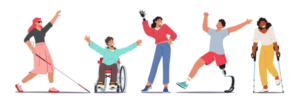Promoting Disability As Diversity and Accessibility as an Institutional Priority
by Dr. Denise O'Neil Green | November 29, 2022 10:00 AM
 In the United States, legal challenges to race-conscious higher education policies have required that practitioners and researchers continue to focus on race/ethnicity to the exclusion of other diverse populations, including students with disabilities.
In the United States, legal challenges to race-conscious higher education policies have required that practitioners and researchers continue to focus on race/ethnicity to the exclusion of other diverse populations, including students with disabilities.
In Canada, postsecondary institutions are not besieged with such challenges. On the contrary, instead of race/ethnicity, Indigenous peoples, first generation, and persons with disabilities primarily occupy the diversity space. Black students, international students, and neurological disabilities have gained more attention.
In the book titled Disability as Diversity in Higher Education: Policies and Practices to Enhance Student Success, my colleagues and I published a chapter in section IV – Institutional Programs and Initiatives. In this chapter, Access Ryerson: Promoting Disability as Diversity, we showed how Ryerson University (now named Toronto Metropolitan University) located in Toronto, Ontario, Canada, has integrated accessibility into an equity, diversity, and inclusion framework with a systemic, organizational approach called “Access Ryerson”. It describes several key components of the Access Ryerson Initiative, which aims to make the institution fully accessible: 1) foundational principles, 2) leadership structure and components, and 3) working groups. Ultimately, the chapter demonstrates how the university community is addressing barriers to inclusion experienced by people with disabilities through the lens of disability as diversity, not a deficit.
In addition to the Accessibility for Ontarians with Disabilities Act (AODA) principles, Access Ryerson created its own set of foundational principles and values that underpin it. This institutional priority is committed to accessibility in the classroom, accessibility in the workplace, and accessibility on campus. In order to expand the mandate of the original committee, working groups were created to address barriers in particular areas.
Access Ryerson aimed not to be reactive but to examine systemic, institutional structures, moving beyond complaints to champion a more accessible environment proactively. Under my leadership as Vice Provost, EDI and the founding Vice President of the Equity and Community Inclusion division, disability and diversity were strongly connected. Access Ryerson is a critical institutional initiative that advances the notion of disability as diversity, with an even more decisive rejection of disability as a deficit.
How have you made accessibility an institutional priority? What are the key components that make it effective within your university and/or organizational culture?
Let’s share and connect. I’d love to hear your thoughts.
Reference:
Green, D.O., Willis, L., Green, M. D. and Beckman, S. (2017). Access Ryerson: Promoting disability as diversity. In E. Kim and K. Aquino (Eds.) Disability as diversity in higher education: Policies and practices to enhance student success (pp. 200-215). Abingdon: Routledge.
Source URL: https://institutionaldiversityblog.com/promoting-disability-as-diversity-and-accessibility-as-an-institutional-priority/